Worm infections are a group of diseases that manifest the presence of parasitic worms in the body.
Worms in humans, the treatment of which requires a comprehensive approach, cause a lot of unpleasant sensations for their owners.Parasitic diseases caused by various types of helminths (worms) and/or parasitic worms are common in many different populations. So, trichinosis is often detected in people whose activities are related to hunting or animal husbandry, and diphtheria is a common disease among amateur and professional fishermen.
Attention!Sometimes it is difficult to identify the symptoms and signs of worms in humans and the treatment can be erroneous, because helminth infections are very similar to the symptomatic pathology of some gastrointestinal diseases, with diseases of the gastrointestinal tract. liver, gallbladder. and other infectious diseases.
Infection method
How do parasitic arthropods enter the human body? There are several known methods of helminth infection:
- through the surface layer, i. e. the soil where the parasitic worms lay their adult eggs;
- through contact with infected domestic or wild animals, birds or aquatic animals;
- through contaminated food that has not been adequately heat treated;
- A large number of helminth eggs drift into open waters, which is also a source of infection;
- In some cases, bites from biting or blood-sucking insects are the source of infection.

However, the most common method of infection is person-to-person transmission.
Parasitic diversity
Today, there are more than 250 different types of parasitic worms that are harmful to human health. The frequency of infection depends on social conditions and climatic zones. Let's determine how dangerous certain types of worms pose to humans and how their treatment requires immediate therapeutic intervention. Let's consider the most common and dangerous types of parasitic worms in the human body:
- Pinworms are a type of free-living parasitic roundworm whose preferred habitat is the human intestine. Parasitic in the small intestine or cecum, these worms reach the ileum, where they mate. After fertilizing the female, the male stops vital activity and the pregnant female, filled with eggs, continues its journey through the rectum, crawling out through the lower opening of the digestive tract. After laying eggs in the folds around the anus, the pinworms die. This movement throughout the body lasts about a month. Travel through the gastrointestinal tract has its consequences. The appearance of worms in humans, symptoms and treatment are determined by a disease called helminthiasis, which is the most common type of helminth infection.
- Roundworms are round worms, with an overall length of up to 40 cm. Sexually mature females lay more than 200 thousand eggs. Their favorite place is the digestive tract, especially the small intestine. . Roundworms cause human worm signs, symptoms and treatment identified as ascariasis - one of the types of helminth infections. The free movement of parasitic worms irritates the small intestine, affecting its ability to function. By parasitizing internal organs, roundworms not only affect the digestive tract but are also unexpected visitors to the respiratory and/or genitourinary systems. Cases of roundworms invading the frontal sinuses, nasolacrimal ducts and hearing aid exits have been recorded.
- Trichinella is one of the protozoan round parasitic worms, the larval stage begins in the elastic tissues of the muscular system, after which adult individuals are delivered to the small intestine. Infection with this roundworm leads to a fatal disease - trichinosis. Worms in human muscles, symptoms, treatment and diagnosis are determined by facial swelling, skin rashes, muscle pain and blood eosinophilia. More severe levels of clinical pathology are characterized by damage to internal organs and the central nervous system. It is difficult to identify Trichinella in the human body. All symptoms occurred without any complications. Only after entering the central nervous system can one identify the symptoms of worms in adults - treatment in this case is aimed at restoring neurological disorders, for examplesuch as ataxia or respiratory paralysis.
- Intestinal Giardia is a flagellated protozoan parasite that stimulates protozoan invasion into the human body with primary lesions in the small intestine and is the causative agent of giardiasis. By attaching to the walls of the digestive organs, the parasite feeds on decomposition products. The favorite food of adult lamblia is flour and sweets. Excreted in the feces in the form of spores, the parasite penetrates into the external environment. Often, when examining the biochemical laboratory during the treatment of worms in adults, it is found that Giardia cysts enter the body through chlorinated tap water.
- The causative agent of another type of helminth infection is whipworm, which affects the organs of the digestive system, causing trichocephalus. A fertilized female parasitic worm will lay up to 10, 000 eggs within a day. Larval development of whipworms occurs without an intermediate host. Worms enter the body and damage the mucous membrane of the colon, thereby causing acute disorders. In some cases, roundworms are the cause of inflammation of the appendages of the cecum, i. e. appendicitis. Prolonged presence of parasitic worms can lead to anemia.
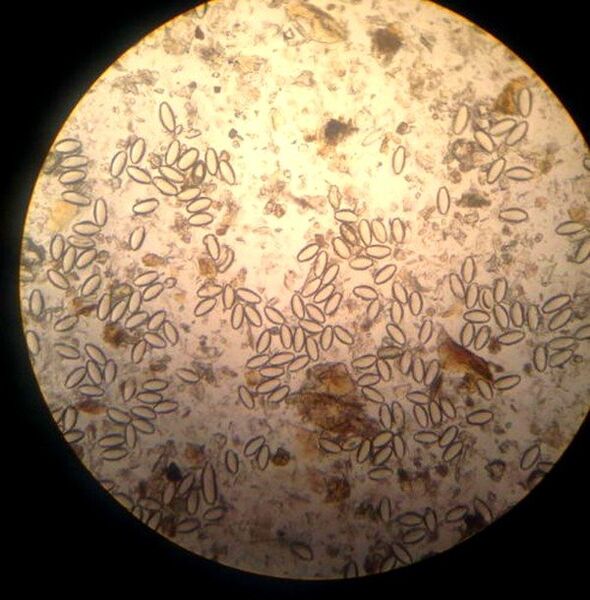
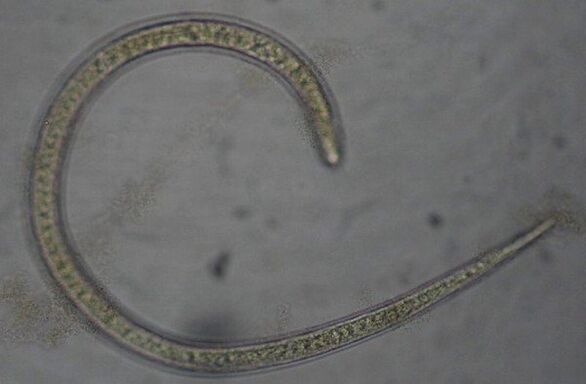
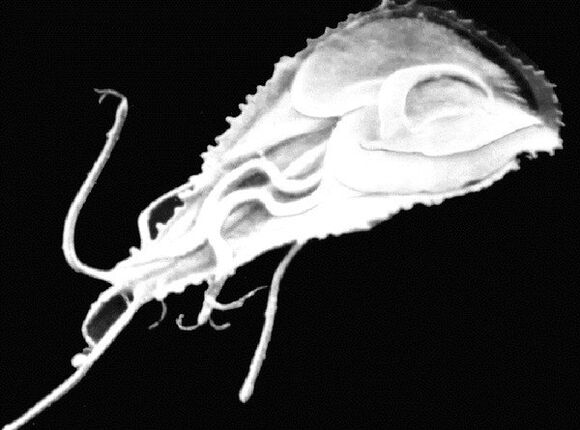
Identify signs and symptoms of infection
When worms and parasites are identified in humans, treatment is determined by symptomatic signs and biochemical laboratory test data. Typical signs and symptoms of helminth infection:
- pale skin;
- general weakness of the body;
- dizzy;
- itching in the anus;
- functional disorders of the intestines;
- allergy;
- period of change in body temperature.

Toxic effects on the body lead to a decrease in immunity, as a result of which the inflammatory process in chronic diseases worsens.
Attention!A characteristic feature of the long survival of parasitic worms is a sharp decrease in the body weight of the helminth carrier.
Home test to detect helminths
With the help of a simple test, which must be carried out by an infectious disease consultant or parasitologist, you can check for possible signs of helminth infection. Count the number of questions answered yes.
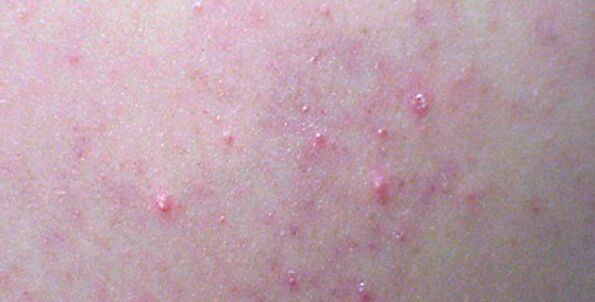
The risk of infection exists with 10 "yes" answers and more than 15 answers is the possibility of developing helminth disease:
- Are there any rashes on your body that you haven't had before?
- Are you bothered by frequent bloating, gas, diarrhea or constipation;
- Is there constant itching in the anal tract;
- Do you often have headaches or dizziness during the day?
- whether there are sudden bouts of nausea or gag reflex;
- Have intermittent sleep for no apparent reason?
- whether the lymph nodes are enlarged;
- Whether your legs are swollen or not;
- You are worried about fatigue and constant fatigue;
- Is the mucous membrane of the eye yellow?
- Do you feel a constant bitter taste in your mouth?
- Have any allergic symptoms – cough, rhinitis, asthma;
- Do you feel constant pain or heaviness in your stomach?
- there are temperature changes without a motor;
- Whether or not there are preschool children in the family;
- Are there any pets or birds;
- whether the pain occurs in the muscles and joints without the effects of physical activity;
- Do people around you complain about your snoring or teeth grinding at night?
- Is there complete indifference to food;
- Do you often forget to prepare raw vegetables and fruits?
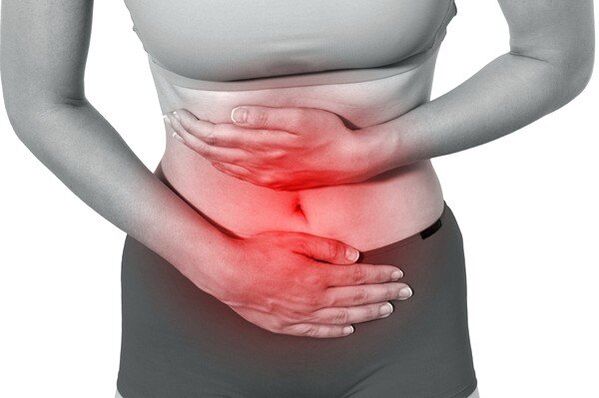
If, based on the results of a home test, there is a possibility of infection, you should contact a specialist.
Lung damage
Attention!Worms in the human lungs are considered a very dangerous and rare disease - in such cases, symptoms, treatment and signs must be identified at the early stages of the infection, thisquite difficult to do.
The clinical symptoms of the disease are very similar to bronchopulmonary disease, manifested in the following general symptoms:
- attacks of nausea and/or vomiting;
- shortness of breath;
- wheezing in the lungs;
- shortness of breath;
- increased body temperature;
- Cough with phlegm, etc. v.
The agents that cause lung damage are many types of tapeworms, pork tapeworms and roundworms.

Helminth infection in visual organs
Itching, irritation, increased sensitivity and allergic-type burning sensation in the sensory organs can be caused by worms in the human eye; The treatment of such helminth infections is a laborious process. It requires certain skills from a specialist, since parasitic worms constantly move throughout the visual organ. Symptoms can be identified by constant irritation of the eyelids, similar to the chronic inflammation in blepharitis. You can see how worms appear in the person after treatment of eye helminth infection in the photo.
How to get rid of helminths: treatment methods
Today, infectious disease specialists and parasitologists have at their disposal more than 20 drugs and anthelmintic agents, the treatment of which can eliminate worms from humans. Treatment with broad-spectrum or narrow-spectrum anthelmintics effectively fights parasites, provided the diagnosis is accurately established and laboratory testing for helminth pathogens is carried out. When choosing a treatment regimen, it is necessary to take into account the patient's age, gender and weight criteria, since antihelminthic treatments are highly toxic. Synthetic dosage forms have replaced traditional folk remedies - garlic, chenopodia oil, fern, etc. v. After determining the symptoms, the treatment of worms in humans with tablets consists in completely cleansing the body of helminth infection.
The most effective dosage forms are broad-spectrum drugs that can fight most intestinal and extraintestinal helminths. Treatment of worms in humans with pills is usually divided into pharmacological combinations consisting of anthelmintic, anti-infective and anthelmintic action. Below is a list of the most popular drugs that help get rid of different types of helminth infections:
- A synthetic broad-spectrum anthelmintic drug of the benzimidazole group, widely used in the treatment of bristleworm disease, intestinal worm disease and other manifestations of intestinal infections caused by nematodes. Active absorption of the drug into the circulatory system depletes glycogen reserves in the tissue structures of parasitic worms. Treatment duration and dosage are determined by the infectious disease consultant or parasitologist.
- A drug belonging to the group of imidazothiazoles is a dosage form with antihelminthic properties that have a positive immunostimulating effect. Drug treatment paralyzes the parasite's muscular structure, inhibits its fumarate reductase, and impairs the helminth's bioenergetic activity. The drug is prescribed as an antihelminthic drug when the following diagnoses are determined: trichostrongyloidosis, onchocerciasis, toxocariasis, onchocerciasis, etc. v. Dosage and duration of treatment are determined according to individual characteristics.
- The pharmacological drug belongs to the group of antihelminthic drugs benzimidazole. The action of the drug is aimed at blocking and paralyzing the nerve endings of helminth parasites. Paralysis prevents worms from attaching to the intestinal wall and eating rotting products. The appearance of parasitic worms occurs naturally. The dosage form is provided free of charge at pharmacies. However, you should consult your doctor before use.
Help from traditional medicine
Helminth infection is also a psychological blow that an adult tries to hide from others for many reasons. Alternative medicine will help remove worms from the body using folk remedies. To fight helminth parasites, many herbs are used, which are no less effective than drugs:
- onion;
- dandelion;
- burdock;
- nettle;
- Carnation;
- wormwood;
- garlic;
- wormwood, etc. v.
An equally popular way to treat helminth infections is to eat raw pumpkin seeds. However, for adequate treatment, it is necessary to consume 150-200 g of pumpkin seeds per day, provided that the duration of treatment at home is 3-4 weeks.

The most effective traditional medicine recipes for removing worms from the body:
- A half-liter jar put chopped onions in the middle and pour vodka or alcohol solution. After one day of exposure, the drug is filtered and used for its intended purpose. Take 2 tablespoons 4 times a day for a week.
- Crushed pomegranate peel is poured into a glass of vodka or diluted alcohol. The medicine is taken daily, one tablespoon every 3-4 hours.
- A decoction of green walnut shells is very useful. The product is ground in a mortar, poured with wine and soaked for 2-3 days until a distinct brown color forms. Take one spoonful one hour before meals.
- Boil two chopped garlic cloves in 200 ml of milk until completely dissolved. The drug is taken in one dose before meals.
- One teaspoon of wormwood is mixed in 250 ml of boiling water. After cooling, the remedy is ready for use. The filtered liquid should be taken an hour before meals 3 times a day.

A very effective preventive measure is fresh carrot juice, 200 ml of which should be taken on an empty stomach for two weeks.
Preventing helminth infections
Prevention of worm parasites includes compliance with sanitary and hygienic standards, which must be strictly observed not only by adults but also by children:
- Need to wash hands with soap before eating, after traveling and contact with animals;
- Food must undergo heat treatment before consumption;
- Avoid eating street kebabs and seafood vendors.
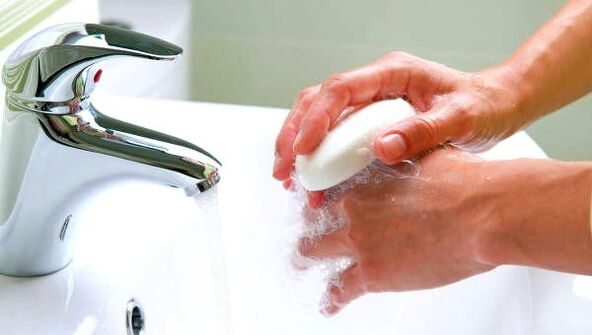
Also, remember to carry out daily ventilation of the living space and do not forget about wet cleaning.
Take care of yourself and stay healthy!























